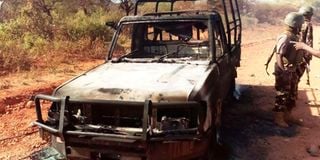Premium
Clan militias or al-Shabaab? Gun raids fan ethnic clashes violence

The shell of the police vehicle which was burnt by suspected Al-Shabaab militants in Mandera on June 7, 2021. Five people were killed in the incident.
As armed criminals unleash violence in Mandera County, leaving behind a trail of death and destruction, a raging dispute between Governor Ali Roba and the national government over the identity of the bandits is hogging the limelight and threatening to derail an effective response to the attacks.
Mr Roba on Friday accused the national government of unfairly blaming local clans for the violence, which he insists the Somalia-based terrorist group, al-Shabaab, is responsible for.
This contradicts what President Kenyatta said on June 9 in Kajiado County while presiding over the destruction of illegal firearms. The President appeared to blame local politicians for the attacks.
Decisive action
“Don’t hide behind al-Shabaab to fan inter-clan conflict. We are aware and I urge you to stop it before we take decisive action,” the President said during the destruction of more than 5,000 illegal guns in Ngong.
His remarks suggested local politicians with a hidden agenda were behind the attacks.
In February, Mr Roba claimed that al-Shabaab controlled 60 per cent of Mandera County. The national government vehemently denied the allegations.
On Friday at a security meeting attended by East Africa Community Cabinet Secretary Adan Mohamed and North Eastern Regional Commissioner Nicodemus Ndalana among other leaders, Mr Roba repeated the claims and told the government to stop linking the attacks to inter-clan conflict, citing them as dangerous.
“The risk of pitting communities against each other is worse than dealing with al-Shabaab,” he said. “We know al-Shabaab has been actively recruiting within local communities for the past 11 years and our own children have been affected.”
Mandera County has recorded more than 10 terrorist attacks over the past two months, leaving dozens dead and many others injured.
On May 21, a roadside bomb hit a police vehicle at Darklae. It left three officers dead and three injured. A day later, raiders invaded Hareri Hosle village. They killed a police reservist and stole his firearm.
Sprayed with bullets
On July 7, a convoy of two buses and a police vehicle was ambushed and sprayed with bullets on the Olla-Sarman stretch.
The attack left five people dead — three police officers and two civilians. At least 15 other people were injured.
Two other people were killed on June 10, when a Kenya Wildlife Service vehicle hit a roadside bomb at Qoqayi in Mandera West.
Governor Roba now wants intensive training of National Police Reservists (NPR) to fight the menace.
“We need to have the NPR trained properly with the resources we have. This can be done locally by the security agencies that we have in Mandera County,” he said.
Mr Roba pledged to ensure the local community was made aware of their role in combating terrorism. He also pledged to work with the national government—subject to building trust between it and area residents.
“The government has to build trust between itself and the local community so that we can partner and combat terrorism together,” he said.
Mr Ndalana blamed lack of coordination in the security apparatus for the failure to deal effectively with terrorists.
“I need to know why the Banisa team failed to inform their Mandera North counterparts of the security situation leading to the attack of two buses and police officers escorting them,” he said.
At the same time, he asked Mandera County Police Commander George Seda to investigate and report back to him.
Mr Issack Harun, a clan elder, echoed the governor. He said the war against al-Shabaab would only be won through trust between the government agencies and the local communities.
“We need to stop the blame game and trust each other so that we win the war against al- Shabaab,” he said.





